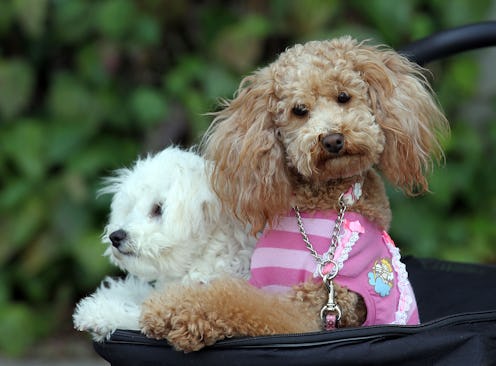Life
Here’s How Much A Small Dog ACTUALLY Needs To Eat

While it might be obvious that there are differences in nutritional needs between large and small dog breeds, the exact breakdown isn't entirely intuitive. A small dog has a small stomach, so you might be surprised by how much a small dog needs to eat. Spoiler alert: a little body doesn't mean little appetite.
Smaller dog breeds tend to have fast metabolisms. This means that they're so active and their mass-specific metabolic rate is so charged that they burn through their calories faster than some larger breeds. Large breeds can store energy better, so they can utilize their calories slowly and evenly throughout the day. Small dogs need to take in more calories per pound of body weight than larger dogs do because their energy reserve is fleeting. This means that small dogs technically need to eat more. To accommodate this, most small dog breed foods are more dense than large dog breed foods.
To depict this in digestible terms, let's look at my dogs: I have a 12-pound Maltese and a 55-pound Labrador. In order to stay equally energized throughout the day and to have the same will and endurance to play, run, and be alert, my Lab needs only one large meal at dinner time, while my Maltese needs a small meal in the morning, snacks in the afternoon and a larger meal at dinner time. The food that my Lab is eating has more fillers than the food that my Maltese is eating, too. My Lab's food has protein, fat, carbohydrates, vitamins, minerals, and caloric fillers like grains, whereas my Maltese's food has no extra fillers and more dense quantities of the good stuff.
As for the actual breakdown of how much food a small dog should literally be fed, you'll want to consult with your vet, as there is no universal standard that's pound-for-pound. For example, a docile or inactive Corgi could weigh the same as a larger breed dog like a Shepard, but should not be fed the same amount of food. Dogs that exert more energy or have more active lifestyles often need more calories in order to stay bright and healthy. Similarly, dogs that spend most of the day lazing around the house don't always need the weight-recommended caloric intake, as that can lead to obesity.
While a chubby puppy might be cute, medically speaking it's not a good look. Vets stress the importance of adjusting your dog's caloric intake to their activity level and limiting table scraps to keep your dog in a healthy weight class. Obesity in dogs (particularly small dogs) can cause high blood pressure, respiratory conditions, overheating, diabetes, liver disease, a decrease in immune support, pain, discomfort and depression. If you're not sure how much you should be feeding your small pup, you should check with your vet. And if your dog has become more or less active, due to bodily changes, weight or age, check with your vet to discuss how to alter your pup's diet to reflect their current condition.